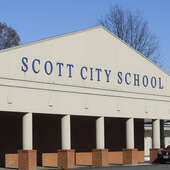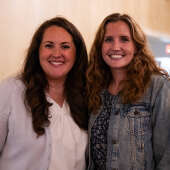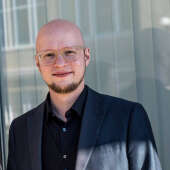Stan Crader Shares Passion

In 1920s Germany, Andreas Stihl saw a need for a revolutionary portable chainsaw that would make the timber-harvesting industry more efficient. So, he created one. This invention would be the catalyst for what is today known as STIHL.
Approximately 90 years later, Southeast Missouri native, Crader Distributing Company president and writer Stan Crader saw the need for the story of the STIHL company and its pioneers to be told. So, he wrote a book about it.
This problem-solving initiative is how Crader lives his life.
“You can’t do something about everything, but you can do something about a few things,” Crader says.
“Some people look at something and say, ‘Somebody ought to do something about that sometime.’ Well, a more convicting thing would be, ‘I need to do this specific thing about that now.’”
Crader decided to write the book now known as “STIHL American: Exemplary People — Extraordinary Times” in 2014, inspired by his attendance to a celebration for the 40th anniversary of STIHL’s first U.S. factory opening in Virginia Beach, Virginia. Known for writing his first three works of fiction, “The Bridge,” “Paperboy” and “The Longest Year,” his co-workers had previously encouraged him to write a book about the company. At the celebration, he observed that many people mistakenly thought STIHL began in 1974.
Crader, however, knew better. His father and grandfather, farm equipment businessmen by trade, had become STIHL dealers in 1959, taking the risk of going from selling five chainsaws per year to having a display of 40. They, along with Stan and his siblings, grew the Bollinger County-based company into the exclusive STIHL distributor for Missouri, Kansas, Nebraska and Southern Illinois that it is today.
As a child, Crader had traveled with his family to Germany in 1966 for the first 40th-anniversary celebration of the STIHL company — a celebration of the groundwork STIHL had lain first, in order to be able to open a U.S. factory.
“It really irritated me because my dad had just passed away in February of that year, and he was one of the pioneers,” says Crader of the misconceptions at the 2014 Virginia Beach celebration. “It struck me that, golly, most of the people here have no idea what had to occur before STIHL even thought about putting a factory here.”
Characteristically, Crader decided to do something about that. His solution? Write the book his co-workers envisioned.
“Forgetting is one thing, but never knowing is another, and if you make that observation, if you think it’s bad that people don’t know, and you don’t do something to teach them about it, then you’re as guilty as they are,” Crader says. “So I decided to start working on the book.”
The story was one that no one else had told through writing. As he began writing the manuscript, Crader found there was nothing in the Library of Congress on the topic. His research consisted of piecing the story together interview by interview, contacting the subjects and their heirs through family, friends and Facebook.
More than three years later, Crader has self-published what he calls his “most important book” yet, because it is about the real people and events of the early STIHL company that have positively influenced many people’s lives today.
Investing in the Future
Crader is donating the proceeds from “STIHL American” to the Fred Whyte Endowment at Old Dominion University in Norfolk, Virginia, which helps business students attend the school. Whyte, the former president of STIHL Inc, was a good friend of Crader’s and an editor of his book.
Crader believes strongly in investing in the future of America through helping and teaching young people. Since going through a Focus on the Family study with his church called “The Truth Project,” which discussed 12 pieces of history taught differently in schools today than in the past, he has worked to ensure that conservative values are being passed on to the next generation.
One way he has done this was through serving on the finance committee of the Southeast Missouri State University Foundation, a position that gave him the opportunity to create an annual speaker series at the university. Through this series, Crader brings speakers to campus to speak about conservative American values. Crader and his wife Debbie, recognizing the rising cost of higher education in Missouri, have established endowments to provide scholarships to students at Southeast Missouri State University and Hillsdale College.
In addition, Crader Distributing Company supports local 4-H and FFA programs, as well as the Liberty Tree Project. Liberty trees were trees that important announcements were made under in town centers during colonial America, the trees under which the Declaration of Independence was read. The last standing liberty tree blew over in 1999. The Liberty Tree Project distributes clones of this tree to 4-H clubs throughout Missouri so they can be planted in public spaces to ensure this piece of history is not forgotten.
“People complain about kids,” Crader says of the work he’s done with young people through these programs. “They ask, ‘Where is the world going to?’ Well, you’re hanging around with the wrong kids. … You go hang around with the 4-H and FFA kids — we’ve got some pretty good leaders coming along.”
“I write because I have something to say”
While speaking with a student at Old Dominion University in February, Crader was asked what important piece of advice he would give to business students. He replied, “I would tell them to maintain their integrity at all costs.”
This is a mantra Crader credits to the people who have helped shape him — his dad and grandfather, both mayors of Marble Hill whom he cites as “good examples he’s had along the way,” as well as his mother and grandmother. A sense of right and wrong was instilled in him from a young age, he says, through the Christian morals with which his parents and grandparents raised him. These are values Crader tries to continue living and growing in each day.
Crader and his wife have three grown sons and three daughters-in-law, as well as five grandchildren who enjoy feeding the fish and playing at the Craders’ farm. Crader also enjoys photographing landscapes, reading and writing. He began flying with his dad when he was in seventh grade and earned his pilot license as soon as he could thereafter. Since, he has taken many flights, including flying across the Atlantic Ocean to Athens, Greece, and photographing the Kangerlussuaq Range in Greenland along the way for a National Science Foundation study determining the change in ice levels.
Crader says the key to balancing active church, family, business, civic and personal lives is maintaining priorities.
“You have to know when it’s appropriate to do one thing over another,” he says. “You have to have a sense of priorities, and I have to work on honing my sense of priorities because it can easily get out of whack.”
This sense of personal responsibility to the legacy of his family and to the history that has allowed him to be where he is today is what motivates Crader to write.
“There’s so many great things that go unnoticed, and if someone doesn’t say something, it continues to go unnoticed,” he says. “There’s a lot of great people who should be recognized.”
































